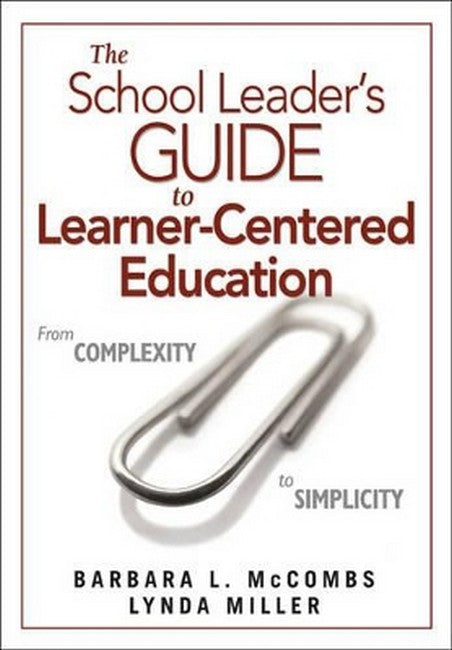Barbara L. McCombs directs the Human Motivation, Learning, and Development Center at the University of Denver. The center focuses on the professional development of educators, personal and organizational change, systemic educational reform, and school violence prevention. McCombs' current research is directed at new leadership models for redesigning outdated views of schooling and learning. This research has led to her international and national recognition in areas that include transformational teacher development approaches, motivating hard-to-reach students, and the use of technology as a primary tool for empowering youth and facilitating relevant learning. The author has begun a series of books published by Corwin Press. Learner-Centered Classroom Practices and Assessments: Maximizing Student Motivation, Learning, and Achievement (2006) was co-authored with Lynda Miller and written for teachers. Her second book in the series, written for school administrators and other school leaders, was also co-authored with Lynda Miller and is titled A School Leader's Guide to Creating Learner-Centered Education: From Complexity to Simplicity (2008). McCombs is the primary author of Learner-Centered Psychological Principles (LCPs): Guidelines for School Redesign and Reform. She has developed research-validated learner-centered models of teaching and learning based on the LCPs. Through collaborations with colleagues at the University of Bristol in England, she developed an online version of her Assessment of Learner-Centered Practices (ALCP) teacher and student surveys. These surveys have been validated with over 35,000 students and their teachers in Grades K-3, 4-8, 9-12, and college level. The ALCP surveys are being used in numerous national and international K-12 schools as well as colleges. Lynda Miller began her professional career as a junior high school English teacher in Westminster, Colorado. Her interest in language and cognitive development led her to graduate studies, which culminated in a PhD in language development and disorders and learning disabilities. She has held teaching positions at the University of Colorado, the University of Montana, and the University of Texas at Austin, where she pursued her research on cognition, learning styles, and intelligence. Her research and teaching focused on identifying and describing students' learning strengths and abilities, and on translating that information into instructional strategies designed to support students' developing skills as motivated, self-responsible learners. Miller is the author of numerous publications on a variety of topics, the majority of which focus on the learner and learning as the essential features of successful instruction.
Request Academic Copy
Please copy the ISBN for submitting review copy form
Description
Acknowledgments About the Authors 1. Why This Is a Time for Change Why Read This Book? Schools as Living Systems What Does "Learner-Centered" Mean? How This Book Is Organized How Do You Like to Learn? 2. What We Know About Learning and Leading What Kind of Learner and Leader Are You? What Does Existing Evidence Say About Leadership? The "Big Picture" View: An Ecology of Learning Model What It Means to Be Learner-Centered A Learner-Centered Educational Model What Are the New Notions of Schooling as Part of Living Systems? Self-Reflections What's Next 3. What the Learner-Centered Model Means for Practice What It Means to Be a Learner-Centered Leader What the Research Shows About the Effectiveness of Learner-Centered Models How the Learner-Centered Principles Translate Into Practice at the School Level Implications for Leadership and Building Communities of Learners Self-Reflections What's Next 4. The Tools Needed for the Journey Tools for the Journey Within Tools for a School-Level Assessment System and Leadership Process Implications of Implementing Learner-Centered Leadership Tools Tools for Answering the Truly Important Questions Self-Assessment and Reflection Tools to Chart the Journey Self-Reflections What's Next 5. What Learner-Centered Assessment Tools Can Accomplish What Is Expected of Our Educational System? How School Leaders Can Provide What Is Wanted The Big Issues Facing Today's School Leaders The Leader's New Role in Staff Development Background and Supporting Research for the Assessment of Learner-Centered Practices Surveys Experiencing the School-Level Assessment of Learner-Centered Practices Survey for Yourself Self-Reflections What's Next 6. How We Can Move Toward New Student and System Outcomes Understanding What Is and What Could Be Aligning the New Vision With Existing Realities Dealing With Current System Inequities in New Systems Designs The Learning Partnerships and Networks That We Need The Learning Partnerships You Will Need Self-Reflections What's Next 7. How We Develop Leadership Qualities From Within New Ideas From Brain Research Preparing for the Future Other Characteristics of the Needed Framework Further Leadership Challenges in Creating Learner-Centered Models What It Means to Develop Capacity From Within A Summary: Moving From Complexity to Simplicity Summary Conclusion Self-Reflections Introduction to Summary Chapter Introduction to Additional Resources 8. Summary of Major Points in Each Chapter Chapter 1: Why This Is a Time For Change Chapter 2: What We Know About Learning and Leading Chapter 3: What the Learner-Centered Model Means for Practice Chapter 4: The Tools Needed for the Journey Chapter 5: What the Learner-Centered Assessment Tools Can Accomplish Chapter 6: How We Can Move Toward New Student and System Outcomes Chapter 7: How We Can Develop Leadership Qualities From Within Appendix Resources Glossary of Learner-Centered Terms References Index
"This book is for any school that promotes book studies for professional development or that is looking for ways to reach the student in a personal manner." -- Jean L. Krsak, Faculty, CalStateTEACH "The time is right and the need is profound for learner-centered practices in schools. McCombs and Miller describe the tools available and how a school can use them to make substantial changes that increase student performance." -- Jean W. Pierce, Professor of Educational Psychology

